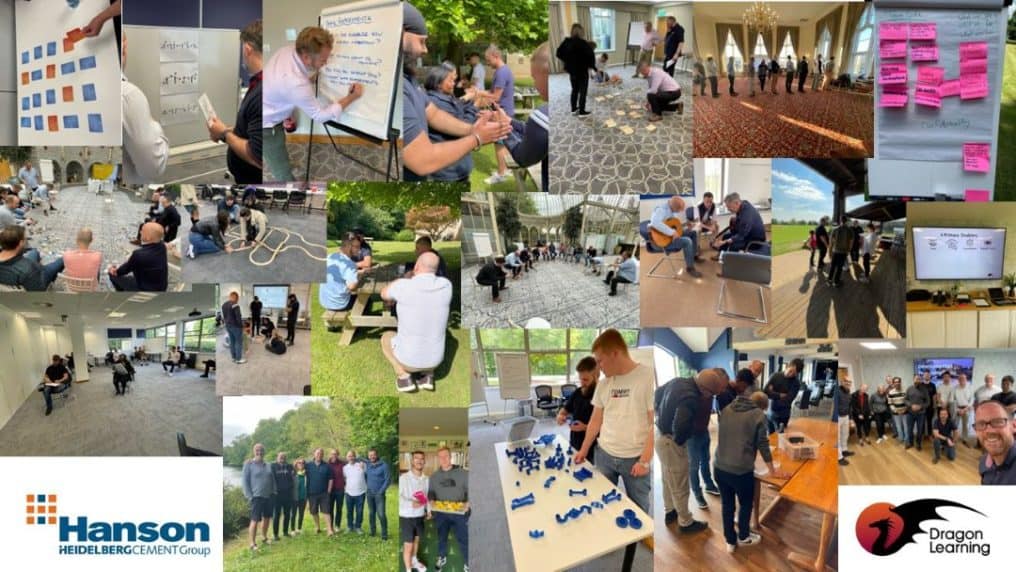Background
Hanson produce and supply raw materials to the construction and engineering sectors, employing around 3,500 staff across 4 main business lines and 300+ sites across the UK. Since the recession of 2008, there had been 3 CEOs with the current CEO taking position in 2018. Organisational progress was hampered by a belief that ‘That’s the way we’ve always done it’; a lack of diversity, a heavily siloed structure and “Command and control” mentality. The business had to transform. Adopting new processes and leading change was imperative to the longterm success of the business.
Approach
In 2019, Hanson, in conjunction with Dragon Learning, developed a series of programs to support the goal of creating a high performing culture. These included a redesigned first line management development programme; a programme to support the EDI strategy and an ambitious programme aimed at supporting behavioural change towards a high performing culture. Delayed by Covid, the latter finally commenced in 2021. The exec team was aligned and the program initially targeted the company’s top 120 influencers. This helped to get other leaders and teams on board and avoid the ‘heads down lads’ issue of previous initiatives. Every programme cohort was mixed across the business lines and seniority.
Each session was designed to have an emotional impact to enable a shift from ‘Understanding’ to ‘Believing’. Theories were explained, but the main approach was to generate an experiential environment where participants initiated safe experiments to make things better for either the individual, the team or the organisation; for example, psychological safety in order to develop trust. These were documented and shared across the business so that everyone could learn from each other.
A series of Enablers were also created to help people focus on behaviours prevalent in high performing organisations; including Trust, Accountability, Communication, Customer Focus and Strategic Vision. Supportive materials and online tools were developed to support the understanding and measurement of these Enablers and participants were able to measure their skills, knowledge and behaviours before and 6 months post-programme.
Outcome
The short and longer term impact of this approach was rigorously measured using various methods including focus groups, 360 degree feedback, the employee engagement survey and business metrics. Over 110 safe experiments have been conducted and shared, and these are still in progress, for example:
‘Reduce the quantity of online meetings and avoid meetings for meetings’ sake’. Outcome – more time saved and people report feeling more in control of their time and work.
‘Stop being the chief problem solver’ – let the team solve problems. Outcome – More empowered teams and more time created to focus on other areas.
‘Ask my team how to empower them’. Outcome – ‘Learnt that I was micromanaging. My team are now happier and I have more time too.’
The average overall candidate feedback score on the program was 89% vs 73% for previous initiatives and Hanson UK has seen the largest positive shift in employee engagement in the last 10 years, increasing from 58% to 68%. Turnover has increased by 36% since 2019 and profit by 259% over the same period.
Hanson UK team members comment: ‘We now check in with each other! This is such a change from our task-focused approach’. ‘The common language is now being adopted across the whole business. This is leading to better communication and stronger relationships within the business and our customers’. ‘I find myself listening to podcasts, exploring new concepts and trying new ways to manage. This is the first time in 15 years. I would never have thought a program could impact me so profoundly.’
Gareth Day, MD Asphalt, comments: ‘I’ve seen a change in the way we go about our business at Hanson in the last three years. It’s a change in attitude. It’s affected people in all areas of the business, including myself. As with any change like this it has affected some people more than others. One of the most powerful changes I’ve seen is an increasing belief that we can each make a positive impact without fear of being knocked-back by a superior or a colleague. That belief means that we are being more proactive, sharing more ideas with colleagues and taking the initiative to make a positive impact throughout the business. It means that decisions do not have to go all the way up the chain of command to be approved or rejected. People understand what our objectives are (which started with our simple approach Work Together, align to customers, Make Time, Concentrate on Margin) and feel that they are empowered to act with those objectives in mind. That results in faster decision making, more engaged employees and ultimately more profit. People within the company are starting to be more comfortable trying something different and taking a risk. That’s going to become increasingly important as we accelerate towards Net Zero Carbon because we will have to innovate far more than we do now to do that.’
Read other Business Culture Transformation case studies here.

